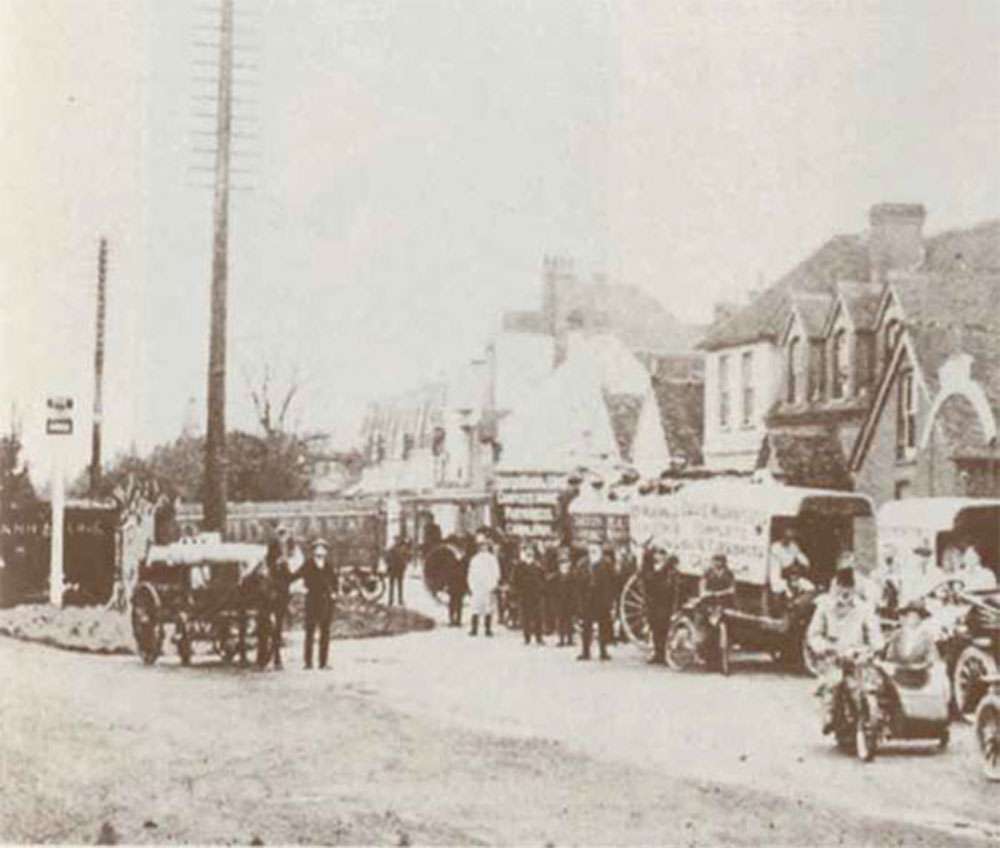
(Above: Mann’s fleet of vehicles just before the War)
At Cranleigh School, a sporting revolution had taken place during the spring term. The April issue of The Cranleighan reported: ‘we are actually playing the despised Rugby’. This marked the change from being a soccer-playing school, and was spearheaded by a rugby-playing master who proved to be a gifted coach. Moreover, the school had recorded its first victory at rugby.
The Cranleigh Infants and Elementary School (to give its full name) had 89 children on its books in April. However, on 3rd April only 50 children attended, owing to an epidemic of mumps in the village. (The incidence of mumps fell dramatically after the MMR vaccine was introduced in 1988.)
The Women’s War Work Committee reported on its activities. There had been 1,160 attendances at the Baptist Chapel, and 275 garments had been sent to Oaklands
Red Cross Hospital and 275 to the headquarters of Queen Mary’s Women’s Needlework Guild, to which the branch was affiliated. Mrs Eric Bonham of Knowle had been secretary until recently, and ‘under her able care, the branch has flourished.’
At the Hambledon Tribunal meetings, employers continued to struggle against the conscription of vital workers. Charles Hight, fishmonger, poulterer and seedsman, of Cranleigh Common, applied for exemption from military service for his shop manager, Ernest Buckman, 28, but was allowed only one month. Messrs. Mann, furniture removal contractors and upholsterers, applied for exemption of their motor driver, Ernest Ledbitter, 25, as he was the only driver they had left. Out of a staff of nine, six had joined the Army. He too was granted merely a month. Mr Hoskins, master butcher and grazier, applied on behalf of Stanley E. Fletcher, his slaughterman, who was the only man left in his business, and the only slaughterman left in the whole of Cranleigh. He was granted two months.
Mr A.B. Johnston of New Park, whose carter had been refused exemption, wrote to the Surrey Advertiser, describing his problems in farming. He described how he and his brother farmed five farms, amounting to 600 acres. His father, 78, had been totally blind for twenty five years and his eldest brother was totally deaf from birth. Another brother had been refused exemption, therefore ‘after harvest (if I can ever get it in), our arable ground – about 200 acres – must again go out of cultivation. Considering that we grew £2,000-worth of corn, straw and roots [root vegetables] in 1915, this seems a very serious matter. This policy is not in Britain’s interest.’
Mr William Welch of ‘Stonewall’ on the Common also wrote to the Surrey Advertiser encouraging women to register with his wife, Mrs Welch, to do farm work. 50-60 Cranleigh women had already done so. ‘Several farmers have expressed their willingness to employ them’, and some women had started work. They were eligible to wear green armlets, supplied by the Board of Agriculture, after 30 days’ work.
Easter Sunday fell on 23rd April this year. At the parish church, Communion services were held at 6am, 7am, 8am, and midday, and the Rector reported in the Parish Magazine that the number of
communicants was three times what it had been twenty years ago.
(Above: Armband of the Women’s Land Army)
The Cranleigh History Society next meeting is on Thursday 14th April for a walk around Ockley, taking in the Mill and the Green.
Meet at The Cricketers at 1.00pm for lunch or 2.30pm outside. Leader Michael Miller (01483 274599).












